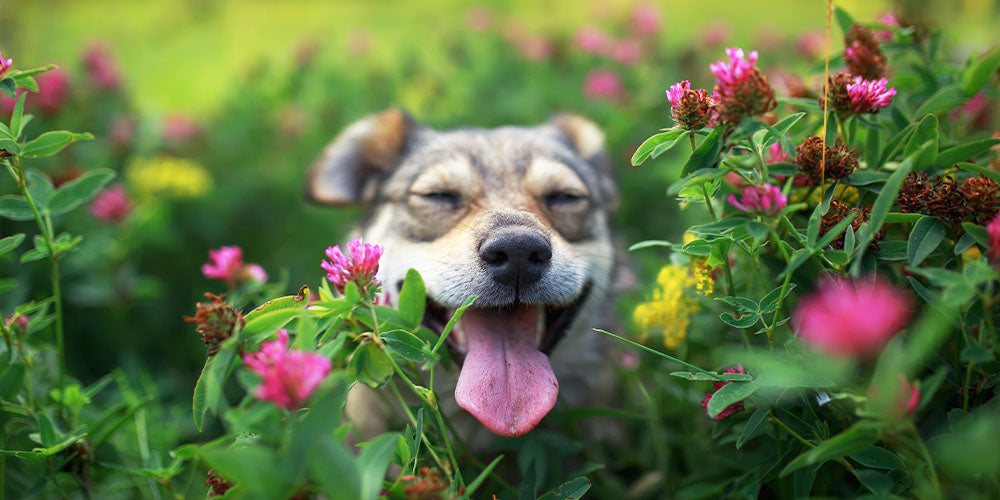When spring and summer hit, it’s like a breath of fresh air. Birds are chirping, flowers are blooming, and all feels well with the world. It’s only natural to feel the urge to romp around in the woods and stray from the beaten path, exploring this brand new world. Left unchecked, though, pets can come home with all sorts of unwelcome hitchhikers, and the danger is higher now than ever before. But fret not! kin+kind has your back with ways to beat the bites. Read on for all-natural solutions for your dogs and cats.

The Problem
The Center for Disease Control (CDC) reports that flea and tick bites have increased by three times in recent years. Does this mean you need to cancel that camping trip? No way! But it is very important to protect yourself and your pets. Here’s what to look for:
Symptoms

Ticks are usually about the size of an apple seed, and you’ll probably be able to feel a bump when petting your pup. Move aside the fur, and behold! A tick may have attached itself.
Tick bites can cause general health issues in pets such as weakness, exhaustion, vomiting, and decreased appetite.

Fleas are a lot smaller and move more, so they might be harder to find. You’ll know to look for them if your pet has:
- Sudden Itching — if your pet starts scratching an intense itch, they probably have some fleas. They may suddenly start biting at the base of the tail or other areas as well. Fleas lay eggs and cause an infestation, so they require a little extra effort to get off once you’ve got them.
- Flea Dirt — fleas often leave behind little specks of dirt, which is actually digested blood! Gross. If you find this on your pet, an area of red, irritated skin is probably not very far off.
- Hair Loss — if you notice hair loss, especially around the tail area, check for fleas. It’s a classic sign, usually due to the scratching to ease irritation or an allergic reaction to flea saliva.

Chemical Pesticides
There are hundreds of treatments available to help with pests, whether from your veterinarian or over the counter. Most of these use chemical pesticides that can be harsh on the skin and, according to the FDA, harmful if not used properly.
The FDA recently alerted “pet owners and veterinarians to be aware of the potential for neurologic adverse events in dogs and cats when treated with drugs that are in the isoxazoline class,” which includes certain pills and chews. These can cause effects “such as muscle tremors, ataxia, and seizure.”
If you choose chemical treatments, it is important to track of which are safe and designed specifically for your pet’s health. As reported by NBC News, the FDA cautions: “Flea treatments meant for dogs can be deadly if given to cats instead.”
Despite the risks, it’s still important to treat for fleas and ticks. This is why we’ve formulated our Flea|Tick treatments with essential oils completely free of chemical pesticides.

Natural Alternatives
Using essential oils doesn’t just smell great; some are approved by the EPA to treat pest infestations naturally! Try kin+kind’s natural Flea|Tick Shampoo for an essential oil-based remedy for fleas, ticks, and their larvae. For easy spray-on protection, use the kin+kind Flea|Tick Protect Spray. Pests hate the smell of the spray’s essential oils, so will avoid your pets so long as you can smell the oils. Spray weekly and before any outdoor adventures. kin+kind’s essential oils are safe for use on dogs and cats, so you can keep all your furry friends safe!

Natural Prevention
An ounce of prevention is worth a pound of cure. Dealing with these buggers can be a nasty and painful business, so take a little extra care to avoid the hassle altogether. Here are some easy ways to make sure you beat the bugs to the punch.
Yard Maintenance
This is your first line of outdoor defense! Keeping a tidy lawn is a great way to make it less hospitable for pests, as they tend to like areas with higher grass. You’ll also want to make sure you’re not leaving out pet food, which can attract wild critters that may have some pests already hitchhiking on them.
Stay on the Beaten Path
Remember how pests like tall grass? Keep that in mind on your next hike and try to generally stay on the paths already carved out for you. If you’re a more adventurous spirit, trek to your heart’s content! Just take extra precaution with a product like kin+kind’s Flea|Tick Protect spray, and make sure you check yourself and your pet thoroughly afterwards. Happy hiking!
Bathing
Maybe this seems like a no-brainer, but bathing your pets regularly with a flea and tick shampoo during peak pest months is one of the best ways to prevent infestations. Baths can both remove infestations and help you regularly inspect for unwanted pests.
Cleaning House
If you have a pet that comes and goes as it pleases, it’s a good idea to make sure you’re cleaning often. Fleas can often live in carpeting and rugs, so give those a nice vacuum. Pests avoid high traffic areas, so make sure you’re getting under furniture and in less-walked areas. Plus, hey, now you’ve got a clean house!
Wash Bedding
We shudder at the thought of having a flea or tick in bed, but it can happen. Regular washing of your sheets and blankets, along with any pet bedding, is an easy way to keep things clean so you can sleep easy.

Natural Products for Your Home and Yard
A great way to protect your home and yard is diatomaceous earth (DE). It’s a naturally-occurring powder that dries out the exoskeleton of bugs and pests. Sprinkle in areas where pests can hide, like tall grasses, under the sofa, and in crevices that pests might hide in.
The best part? It’s totally safe even if you or your pet accidentally breathe it in! In fact, it can even come in “food grade” form to protect gardens.


